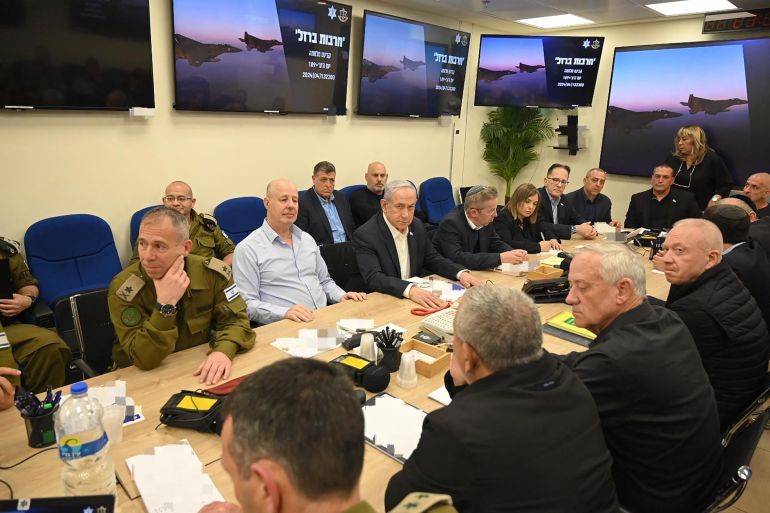Israel army chief pledges Iran response as Western countries urge restraint
Several allies warn against an escalation after Iran’s weekend attack on Israel increases fears of wider regional war.

The head of Israel’s military has said the country would respond to Iran’s weekend attack as several Western countries urged Israel to avoid an escalation of the conflict in the Middle East.
Prime Minister Benjamin Netanyahu summoned his war cabinet for the second time in less than 24 hours on Monday over Iran’s missile and drone attack.
Keep reading
list of 4 itemsThe Take: How Iran’s attack on Israel unfolded
Accusations of ‘double standards’ at UN after Iran’s attack on Israel
Bombs and viruses: The shadowy history of Israel’s attacks on Iranian soil
Israel’s military Chief of Staff Herzi Halevi said his country would respond but did not provide details.
“This launch of so many missiles, cruise missiles, and drones into Israeli territory will be met with a response,” he said at the Nevatim Airbase in southern Israel.
Iran’s attack – launched in retaliation for an Israeli strike on its embassy compound in Damascus earlier this month – has increased fears of open warfare between Israel and Iran and heightened concerns that violence rooted in Israel’s war on Gaza is spreading further in the region.
“We’re on the edge of the cliff and we have to move away from it,” Josep Borrell, the European Union’s High Representative for Foreign Affairs and Security Policy, told Spanish radio station Onda Cero.
“We have to step on the brakes and reverse gear.”
French President Emmanuel Macron, German Chancellor Olaf Scholz and United Kingdom Foreign Secretary David Cameron made similar appeals, echoing calls for restraint by Washington and United Nations Secretary-General Antonio Guterres.
“Neither the region nor the world can afford more war,” Guterres said late on Sunday. “Now is the time to defuse and de-escalate.”
Russia has refrained from criticising its ally Iran in public over the strikes, but expressed concern about the risk of escalation on Monday and also called for restraint.
“Further escalation is in no one’s interests,” Kremlin spokesman Dmitry Peskov said.
Belgium and Germany summoned the Iranian ambassadors over the attack, in which Iran launched hundreds of drones and missiles that the Israeli military said were nearly all intercepted.
Most of the missiles and drones were shot down by Israel’s Iron Dome defence system and with help from the US, UK, France and Jordan.
The attack came in response to an Israeli air strike on the Iranian consulate in Damascus on April 1, which killed seven members of the Islamic Revolutionary Guard Corps, including two generals.
Fears of regional escalation
Tehran’s retaliatory attack on Israel has heightened concerns that violence will spread further in the region.
Wary of the dangers, US President Joe Biden has told Netanyahu that Washington will not take part in any Israeli counteroffensive against Iran.
Since the start of Israel’s war on Gaza in October, clashes have erupted between Israel and Iran-aligned groups in Lebanon, Syria, Yemen and Iraq.
Israel says it is seeking to destroy the Palestinian group Hamas after it led an attack on Israel on October 7, killing at least 1,139 people, mostly civilians, according to an Al Jazeera tally based on Israeli statistics, and taking around 250 others captive.
More than 33,500 people, mostly women and children, have been killed in the Israeli assault on Gaza, according to Palestinian authorities, and large parts of the territory have been reduced to rubble. Aid agencies have warned that parts of Gaza are facing a looming famine amid severe Israeli restrictions on supplies of food and humanitarian aid.